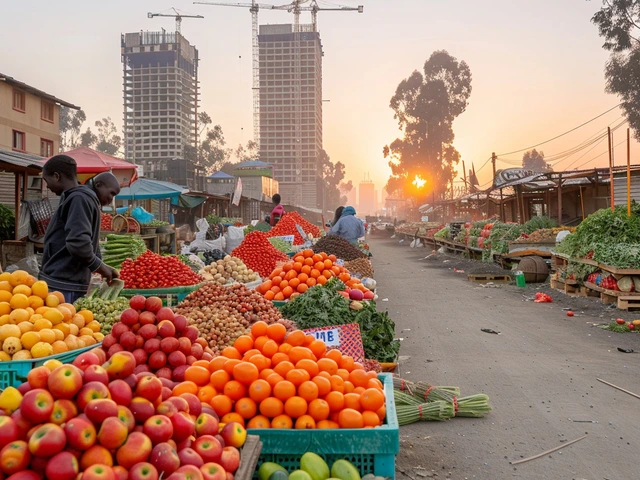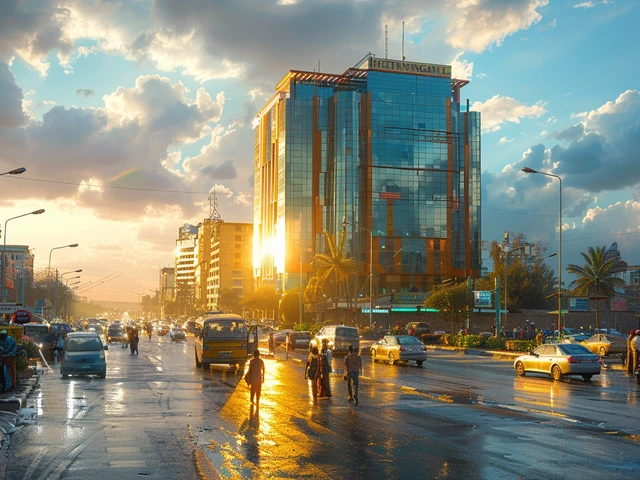Discussing the wealthiest individuals in a country offers more than just a peek into their bank accounts; it reveals a lot about the economic landscape and opportunities within that nation. In Ethiopia, a country known for its coffee and ancient history, there also exists a layer of significant wealth tied to various sectors of its economy.
From telecommunications to agriculture, Ethiopia's richest personalities have carved out empires that not only highlight their financial acumen but also contribute to the country's development. This discussion delves into who these individuals are, the origins of their wealth, and their roles in shaping Ethiopia's economic future.
Introduction
When we talk about wealth, especially in the context of entire nations, it's not just about the digits in someone’s bank account—it’s about understanding the economic veins that sustain a country's growth. In Ethiopia, examining the wealth of the richest individuals does more than satisfy curiosity; it provides insights into broader economic strengths and areas of dynamism. As Ethiopia emerges on the global stage, marked by its fast-growing economy and entrepreneurial spirit, understanding where this wealth comes from, who holds it, and how it is utilized, becomes crucial.
Ethiopia is a land of ancient civilizations and diverse cultures, but today it's also notable for its economic transformations. The richest individuals in Ethiopia, who we will further discuss in subsequent sections, are not just wealthy bibliophiles; they are pioneers in their industries, contributing significantly to sectors like telecom, agriculture, and construction. Their fortunes tell a story of modern entrepreneurship meshed with the opportunities carved out by economic reforms.
The narrative of wealth in Ethiopia is deeply tied to its political and economic policies which have seen shifts aimed at liberalizing the market and attracting foreign investment. These changes ripple across the financial landscapes, influencing both opportunities and the accumulation of wealth. In sectors where these magnates operate, there is a noticeable uplift not just in economic terms but also in employment and infrastructural development. Understanding their journey gives us a glimpse into the potential future of Ethiopia’s economy - a crucial aspect for investors and policymakers alike.
For instance, the telecom sector, historically state-controlled, is undergoing significant changes with new policies that encourage foreign investment and competition. This sector alone has the potential to significantly alter the economic landscape. The role of these wealth magnates in such sectors highlights not only their individual capabilities but also the evolving regulatory and business environment in Ethiopia.
Top Wealth Holders
In the landscape of Ethiopia's wealth, a few names stand out, defining not just personal success, but also shaping the business environment of the country. Among these, the most notable is perhaps Mohammed Al Amoudi, a name synonymous with both wealth and influence in Ethiopia. Amoudi, whose investments in construction, agriculture, and mining have been pivotal, has been frequently listed as one of the richest black billionaires worldwide. His strategic investments have not only cultivated his vast wealth but have also played a major role in Ethiopian employment and infrastructure development.
Another significant name in this discourse is Sebhat Nega, albeit his fortunes are more in line with political influence than straightforward business ventures. Nega’s involvement in numerous state-run projects highlights a different avenue through which wealth can be accrued in Ethiopia. This melding of politics and business is fairly common in many African economies, presenting a unique dynamic in wealth creation.
Shifting focus, the new generation of tech entrepreneurs represents a transformative wave in Ethiopia’s wealth spectrum. Young innovators like Betelhem Dessie are not just accumulating wealth but are also crucial in positioning Ethiopia on the global tech scene. This transition towards technology and innovation marks a significant pivot in the traditional paths to wealth in the nation, suggesting a broadening of opportunities beyond the conventional sectors like agriculture and mining.
The discussion about Ethiopia's richest wouldn't be complete without considering the role of the diaspora. Ethiopians abroad are increasingly influential in terms of investments and economic ties, bolstering the tech and real estate sectors particularly. Their contributions are remapping the traditional contours of wealth and power in Ethiopia, bringing international experience and capital into the local markets.
While these figures paint a picture of Ethiopia’s economic captains, they also open a window into the diverse methods of wealth generation in the country. From mining magnates to tech innovators, the Ethiopian wealthy class offers a microcosm of wider economic shifts and opportunities present in an emerging market environment. The narratives of these wealth holders not only highlight their financial success but also underscore their influence on Ethiopia’s socio-economic fabric.
Sources of Wealth
In Ethiopia, the tapestry of wealth is woven with threads from diverse economic sectors, each contributing distinctly to the fabric of the nation’s prosperity. The richest individuals in Ethiopia have predominantly gathered their wealth through three major avenues: agriculture, telecommunications, and manufacturing. Agriculture, long been the backbone of Ethiopia’s economy, is not just about traditional farming anymore but has seen significant investments in technology and export-oriented agribusiness, driving substantial income for those at the top.
Telecommunications also play a pivotal role. With the government-initiated privatization and subsequent increase in competition, the sector has seen exponential growth. Those who held early stakes in these burgeoning companies have reaped immense benefits. Notably, the manufacturing sector, particularly the production of textiles and garments for export, has transformed into a lucrative arena thanks to government incentives aimed at industrial growth. This diversification of sources reflects a broader trend in Ethiopia's move towards an industrial and service-oriented economy.
Moreover, the construction industry has seen a boom with the urban expansion and the need for infrastructure improvement. This has opened up new opportunities for wealth creation in real estate development and construction services. Some of the country's wealthiest have substantial investments in this sector, capitalizing on the urbanization trend. The rise in real estate ventures has not only multiplied their fortunes but also helped shape the cityscapes of regions like Addis Ababa.
Throughout these developments, family-owned conglomerates continue to hold significant sway. These entities often have their hands in multiple sectors—diversification being a common strategy to both maximize returns and mitigate risks. The strategy involves spreading investments across various sectors to ensure that downturns in one area do not severely impact the overall financial health of the enterprise. This approach has fortified the wealth status of these families, making them pivotal players in Ethiopia’s economic narrative.
Lastly, Ethiopia's move towards renewable energy sources like hydro, wind, and solar power has started to attract investments both domestically and internationally. This shift not only promises a greener future but also opens a lucrative door for those willing to invest early in renewable technologies. With Ethiopia’s bounty of renewable resources, this sector harbors potential for significant economic impact, positioning it as an emergent pillar of wealth generation for the current and future magnates.
Economic Impact
The influence of Ethiopia's wealthiest individuals extends far beyond their bank accounts; it permeates various facets of the national economy. These magnates are often involved in large-scale industries that are crucial to Ethiopia's economic fabric. The impacts of their financial activities are profound, ranging from employment creation to infrastructure development and beyond. Consider how investments and businesses owned by these tycoons help shape economic trends and create opportunities for many Ethiopians.
One significant way in which the rich contribute to the economy is through job creation. Large companies in sectors such as telecommunications, agriculture, and manufacturing are often owned or financed by these wealthy individuals. These sectors are labor-intensive and create thousands of jobs thus directly reducing unemployment rates and alleviating poverty to some extent. Furthermore, as these enterprises grow, there's a trickle-down effect where numerous smaller businesses also flourish.
Infrastructure development is another pivotal area greatly influenced by the investments of the wealthy. Projects related to roads, telecommunications, and energy, which are often a priority for these affluent individuals, play a crucial role in improving the quality of life for many Ethiopians and facilitating other businesses to thrive. This development catalyzes further economic activities, effectively boosting the country’s GDP.
In the real sense, these economic activities associated with Ethiopia's wealthiest do not just grow their personal coffers; they contribute robustly to the national revenue. Taxes and other financial obligations fulfilled by their companies inject substantial funds into the national treasury, aiding government spending on public services. Their role in fiscal contribution underscores not just an economic but a socio-economic impetus stemming from their wealth.
Moreover, the philanthropic endeavors initiated by some of these high-net-worth individuals also play a critical part in the socio-economic development. Educational scholarships, healthcare facilities, and fund donations are some examples of their charity work, which contributes immensely to the wellbeing of the general populace.
Future Projections
The contours of Ethiopia's economic landscape are constantly evolving, with significant influences stemming from both local and international sectors. Predicting the future financial status of Ethiopia's richest individuals requires a keen understanding of the global market trends, local policy changes, and technological advancements. Ethiopia, being one of Africa's fastest-growing economies, is likely to see further shifts in wealth concentration due to these factors.
Recent years have shown a surge in technological investments in Ethiopia, with the introduction of mobile banking and e-commerce platforms. These advancements bode well for the continued growth of wealth among the country's most affluent. The tech sectors, along with traditional strongholds such as agriculture and manufacturing, are set to propel the economy forward, potentially creating new billionaires in the process.
Economic diversity is developing at a remarkable pace, shifting focus from predominantly agrarian to include more industrial and service-oriented sectors. This transformation is closely tied to government initiatives aimed at improving infrastructure and fostering foreign investment. With these changes, there is a robust projection that the upper echelon of wealth holders will diversify their investments, reducing dependency on traditional sectors and embracing new economic opportunities.
While telecommunications magnate remains at the apex of Ethiopia's wealth pyramid, we might witness a shift where tech entrepreneurs and green energy pioneers join the ranks. This is not just optimistic speculation; it's supported by the rise in educational programs focused on technology and sustainable development, aimed at harnessing the intellectual capital of Ethiopia's youth.
On the note of sustainable growth, green energy initiatives are also magnetic poles for investment. Ethiopia's commitment to renewable energies - notably hydro, wind, and solar - has positioned it as a leader in Africa's green energy race. This not only spells good news for the environment but also forecasts a lucrative trajectory for investors in these sectors.

 Is Ethiopia a Low Income Country? An In-Depth Look at Ethiopia's Economy
Is Ethiopia a Low Income Country? An In-Depth Look at Ethiopia's Economy
 Exploring Ethiopia's Booming Industries: Key Sectors Driving Growth
Exploring Ethiopia's Booming Industries: Key Sectors Driving Growth
 Exploring the Safety of Living in Ethiopia: Insights and Tips
Exploring the Safety of Living in Ethiopia: Insights and Tips
 Profitable Banks in Ethiopia: A Deep Dive into Financial Success
Profitable Banks in Ethiopia: A Deep Dive into Financial Success
 Most Common Jobs in Ethiopia Revealed
Most Common Jobs in Ethiopia Revealed
christine mae cotejo
May 7, 2024 AT 19:13Reading through the overview of Ethiopia’s wealth elites feels like watching a grand saga unfold on a sun‑kissed savanna, where each mogul is a protagonist with a destiny intertwined with the nation’s pulse. The narrative begins with the colossal figure of Mohammed Al Amoudi, whose empire stretches across construction, agriculture, and mining, casting a shadow that eclipses many smaller enterprises. One cannot ignore the way his investments have seeded jobs in remote highlands while simultaneously feeding the global market with commodities that travel far beyond the Horn of Africa. Then there’s the political‑infused fortune of Sebhat Nega, a reminder that wealth in Ethiopia still dances hand‑in‑hand with state power, a duet that can either harmonize development or sow discord. The rise of tech prodigies like Betelhem Dessie signals a generational shift, a digital renaissance that could reshape the economic tableau from agrarian roots to silicon‑driven skyscrapers. Diaspora capital, flowing like a river back to its source, enriches sectors such as real estate and fintech, injecting foreign expertise and liquidity into local ventures. Agriculture, once a modest, subsistence‑oriented activity, now blossoms under high‑tech irrigation and export‑grade processing, turning farms into profit engines. Telecommunications, once a monopoly, is now a battleground of innovation, where early stakeholders reap the spoils of a hyper‑connected populace. Manufacturing, especially textiles, is becoming Ethiopia’s new Silk Road, knitting together global supply chains with local labor. The construction boom, catalyzed by urban migration, creates skylines dotted with towers that stand as monuments to private wealth and public ambition. Family conglomerates, with their diversified portfolios, act as safety nets, smoothing out the inevitable market turbulence. Renewable energy, still in its infancy, beckons as the next gold rush, promising both environmental stewardship and hefty returns for those daring enough to invest. Each of these sectors interlocks like pieces of a grand puzzle, painting a picture of a nation in flux, teetering between tradition and modernity. The wealth magnates, whether born at home or raised abroad, serve as both architects and beneficiaries of this transformation, their fortunes reflecting the broader trajectory of Ethiopia’s economic ascent.
Douglas Gnesda
May 10, 2024 AT 02:46Building on that sweeping panorama, it’s worth highlighting the synergetic effect of telecom deregulation and venture‑capital influx, which together have catalyzed a multiplier effect across ancillary industries. When you factor in the elasticity of demand for mobile data in semi‑urban clusters, the ROI on early equity stakes skyrockets, creating a feedback loop that fuels further private‑sector R&D. Moreover, the alignment of fiscal incentives with export‑oriented agribusinesses has essentially engineered a de‑facto public‑private partnership, even if the language remains implicit. This confluence of policy and capital formation not only diversifies the wealth base but also embeds resilience against external shocks, a critical consideration for long‑term macro‑stability.
Abhijit Pimpale
May 12, 2024 AT 10:20The data points you mentioned are accurate, but the analysis lacks nuance regarding regional disparities. Not every province benefits equally from telecom expansion.
Eric DE FONDAUMIERE
May 14, 2024 AT 17:53From a grassroots perspective, the boom in renewable projects is actually creating micro‑enterprise opportunities for local technicians and suppliers. You’ll see small workshops sprouting around wind farm sites, offering everything from maintenance tools to training modules. This bottom‑up growth, while modest, paves the way for a more inclusive wealth distribution. It also aligns with the government’s agenda to reduce reliance on fossil fuels, making the sector attractive for foreign investors who are keen on ESG criteria. In short, the green wave is more than a headline; it’s a tangible catalyst for emerging entrepreneurs.
Pauline Herrin
May 17, 2024 AT 01:26While the optimism surrounding renewable energy is commendable, one must critically assess the governance framework that oversees these investments. Transparency in tender processes, coupled with stringent environmental impact assessments, is paramount to avoid the pitfalls of resource misallocation. Furthermore, the concentration of wealth among a narrow elite can exacerbate socioeconomic divides if profit repatriation is not balanced with local reinvestment. A rigorous, data‑driven approach to policy formulation will ensure that the promised dividends of green infrastructure are equitably shared.
pradeep kumar
May 19, 2024 AT 09:00The reality is that most of these projects remain on paper.